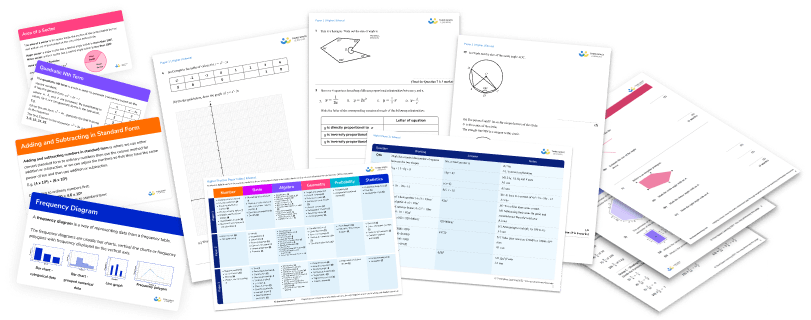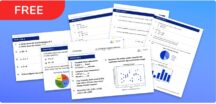Fluent In Five: A Daily Arithmetic Resource For Secondary
Fluent in Five, a daily quick mental maths resource, was pioneered by Third Space Learning to help pupils in UK schools strengthen their fluency in maths. Already in use by thousands of primary schools, it’s now available for secondary schools to download for free.
Before you download it, it’s worth spending a few minutes yourself to find out why using Fluent in Five for 5 to 10 minutes a day with your maths class can make the difference across all aspects of KS3 and GCSE maths. We want you to make the most out of this versatile resource!
If you just want to download the free Fluent in Five secondary resources straight away, here are all the download links.
| Are you a primary school teacher? This blog post refers to the secondary version of this resource. To explore daily arithmetic practice for primary school pupils, please go to the Fluent in Five section of the Third Space Learning Maths Hub. |
Key skills are the bedrock of the KS3 & GCSE curriculum
The maths curriculum requires that pupils have a strong understanding of key skills that form the building blocks of more complex topics.
These skills are often given a high level of focus at a primary level. However, for those pupils who leave primary school without these skills firmly in their long-term memory, it can be a constant challenge for both teachers and pupils to try and develop them while simultaneously engaging in more complex problems.
GCSE Fluent in Five Arithmetic Pack (Half Term 1 Weeks 1 to 6)
Download the first Fluent in Five pack to begin your preparation for GCSE maths. With just 5 minutes a day, these maths questions will help you get ready for exams.
Download Free Now!Building fluency in secondary
One of the issues we find at KS3 and KS4 is a lack of mathematical fluency and automaticity. These terms are often used interchangeably.
- Automaticity is the ability to provide an automatic response to a question. It can be viewed as part of the journey to fluency.
- Fluency is the ability to apply a range of strategies accurately and efficiently.
Pupils that are unable to demonstrate high levels of fluency often find their ability to learn new concepts hindered.
Fluency and memory
The reason for this is that a person’s working memory is the space where we do active thinking. It can only hold a limited amount of information at any one time.
Working memory can quickly become a bottleneck for new information. Everything we learn has to pass through it before that information can be retained and stored in the long-term memory.
If the basic concepts required for more complex ideas are not sufficiently developed, cognitive load is reached long before new learning takes place, with working memory taken up with key skills that are not automatically recallable.
Automatic recall in maths
By developing automatic recall of key concepts and skills (e.g. times tables and basic arithmetic) we can free up space in the working memory. This allows focus to be transferred to more complex problems. Once automaticity is achieved, pupils can then use these building blocks to develop fluency to tackle problems with confidence.
However, to develop automaticity and fluency, pupils must be provided with opportunities to regularly practise and revisit skills. It is not enough to teach a skill and then have pupils complete an exercise on it. In order for knowledge to be retained, pupils must continually practice the skill in a variety of different scenarios.
Importance of practising essential skills
Often many essential skills can be seen as ‘primary’ in nature and something that should already be known at secondary level.
At Third Space Learning, we explored what a great fluency resource would look like. We wanted to provide something that could be easily accessible for pupils and clearly planned for teachers.
We wanted to provide pupils with the opportunity to continually practice and develop the key skills required for being successful with their maths, while experiencing these skills in a variety of different contexts.
Fluent in Five for secondary schools
Building on the primary model, the secondary version of Fluent in Five is designed to support continual practice of skills, while closely aligning with KS3 and the foundation GCSE maths curriculum.
Broken up into weeks and days, skills that are practised over a given week develop in complexity. They are often presented in different contexts that require the pupil to draw on knowledge that has been previously covered.
Discussion points are designed to kickstart and structure class talk.
This helps pupils to:
- Linking together seemingly different areas of maths
- Think around the given topic
We’ve started with Fluent in Five for GCSE pupils as this has always been the area of greatest need. Next up is Fluent in Five for Year 7, which we’ve already started releasing to help you with this academic year!
We will continue adding the links to these resources as soon as they become available from our busy team behind the scenes.
Free Fluent in Five downloads for schools
Fluent in Five for Year 7
Autumn Term
Spring Term
Summer Term
- Weeks 1 to 6 Bundle (coming soon)
- Weeks 7 to 12 Bundle (coming soon)
Fluent in Five for Year 8 is also coming soon!
Fluent in Five for GCSE
You can download the GCSE Fluent in Five resources via the links below.
- Fluent in Five Term 1 Pack
- Fluent in Five Term 2 Pack
- Fluent in Five Term 3 Pack
- Fluent in Five Term 4 Pack (coming soon)
Get a closer look at the Fluent in Five structure
Fluent in Five for secondary provides downloadable blocks of 5 questions to support pupils with key skills. It is split into 6 half terms worth of material that follow the key skills of the KS3 or GCSE foundation curriculum.
Each term is then broken down into 12 weeks of questions. These take the form of projectable PowerPoints and printable worksheets, both of which come with answers to allow pupils to quickly self mark their work.
Let’s look at the individual sections of Fluent in Five secondary in more detail.
This week in a nutshell
Each week begins with a ‘This week in a nutshell’, which:
- Gives a brief overview of the week
- Details the topic areas that will be covered in each question throughout the week
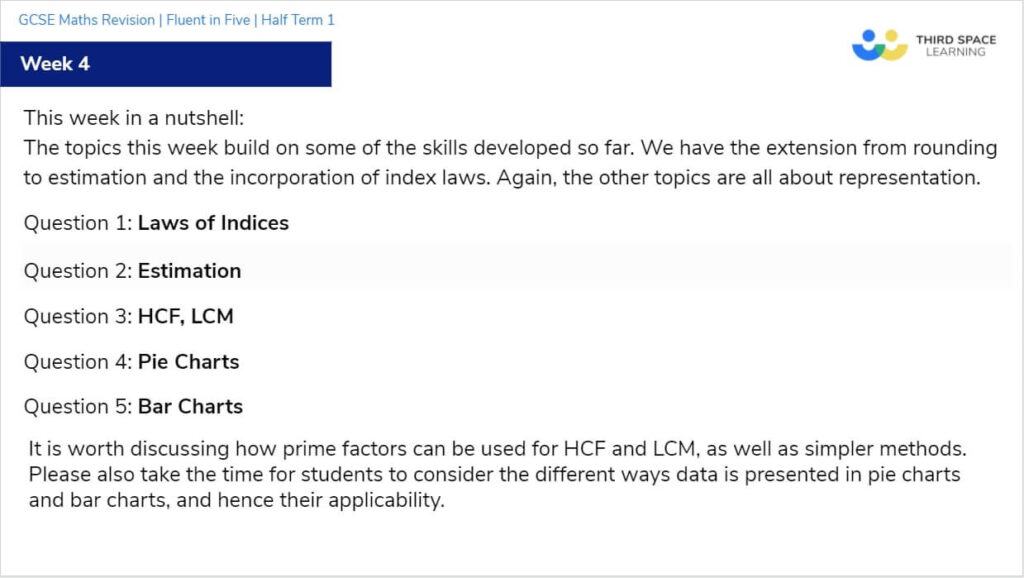
Displaying an overview of the week’s topics here helps the teacher to plan how best they want to use this resource.
Discussion
The quality of mathematical talk is very important.
Maths is about interconnected ideas, so it is important for pupils to not only understand how they have answered a particular calculation, but how and why that answer connects to other areas of maths.
The ‘Discussion Ideas’ slide:
- Supports the exploration of the ideas around the key skills
- Promotes depth of understanding
- Provides suggestions for ways that teachers can begin to explore these topic areas in more depth in the form of class discussions
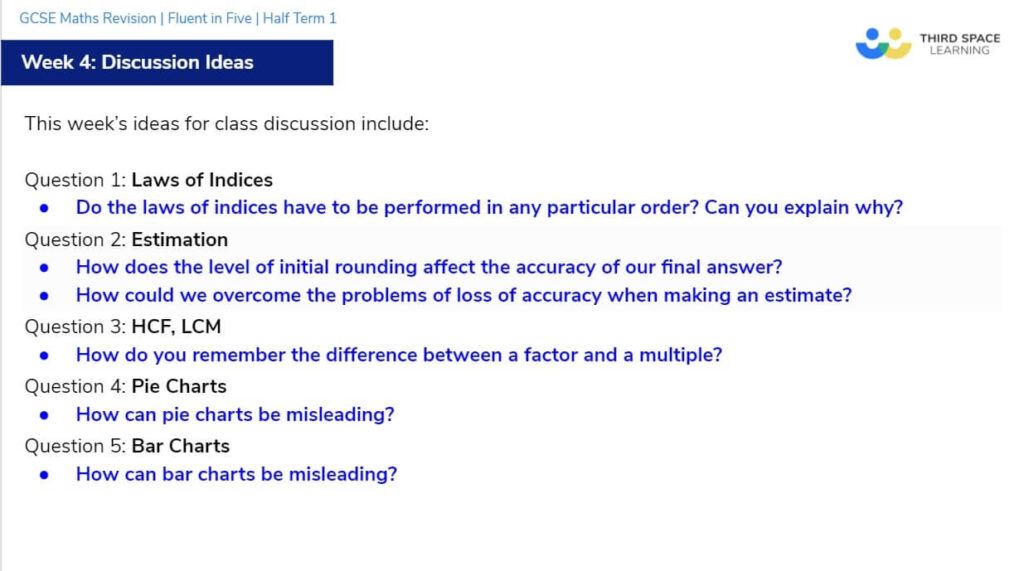
Questions
Each week of PowerPoints and worksheets is split into five days of the school week, so Monday to Friday. Each day has 5 questions on mixed topics with answers provided on the following slide.
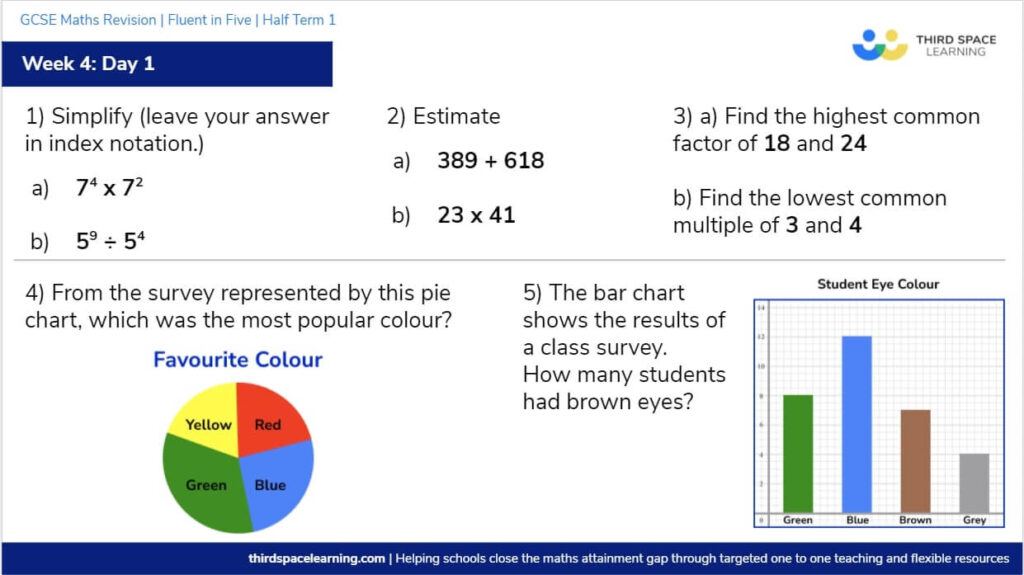
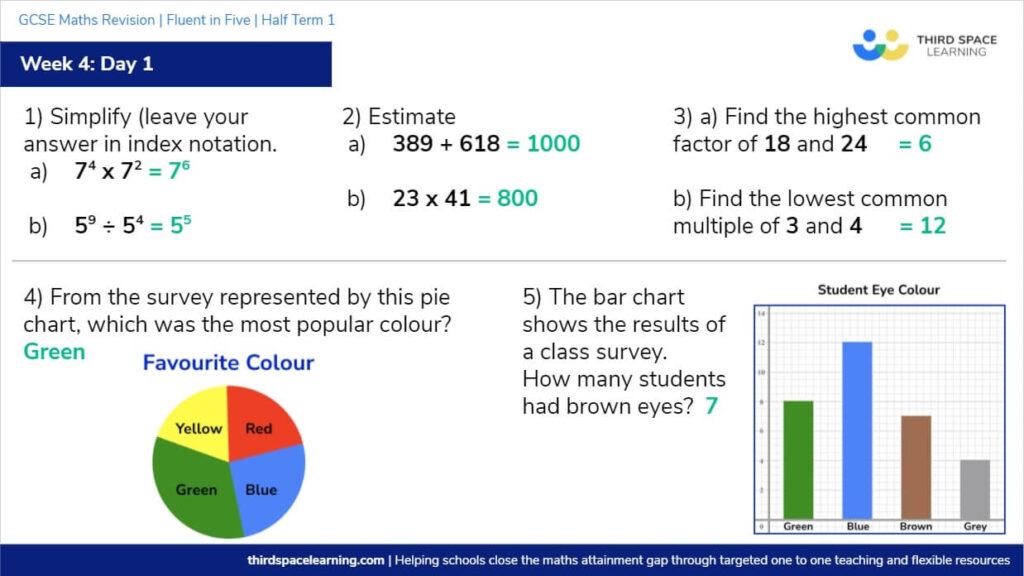
During each day of the week, the topics for each question are kept the same but become more challenging and developed as the week progresses.
For example, in the GCSE Foundation Slides, Autumn Term Week 4, each question 1 on days 1, 2, 3, 4 and 5 is on ‘Laws of indices’. We can see how the questions become steadily more involved as the week progresses, and often recap skills assessed in the previous days.





How to use Fluent in Five in lessons
Fluent in Five is designed to be easily deployed by teachers.
It comes with a number of resources to help teachers select the topics they’re looking for and track progress, which are outlined below.
1) Topic map
We want Fluent in Five to be as accessible as possible. That is why for GCSE we have created the ‘Fluent in Five GCSE Foundation Topic Map’.
Here we have categorised the different topics that make up the questions into ‘Geometry and Measure’, ‘Algebra’, ‘Statistics’, ‘Ratio’, ‘Proportion and Rates of Change’, ‘Number’ and ‘Probability’ and assigned a grade to each.






Pupils and teachers can easily see which half term and specific week each individual topic area is testing. This also enables them to quickly find and practise their desired question. They can then tick off the topic or rate it using a ‘Red, Amber, Green’ or equivalent system.
A similar topic map is being created for KS3.
2) Progress tracker
Each half term comes with a printable ‘Progress Tracker’ poster. This tracker contains tables to record progress each day.
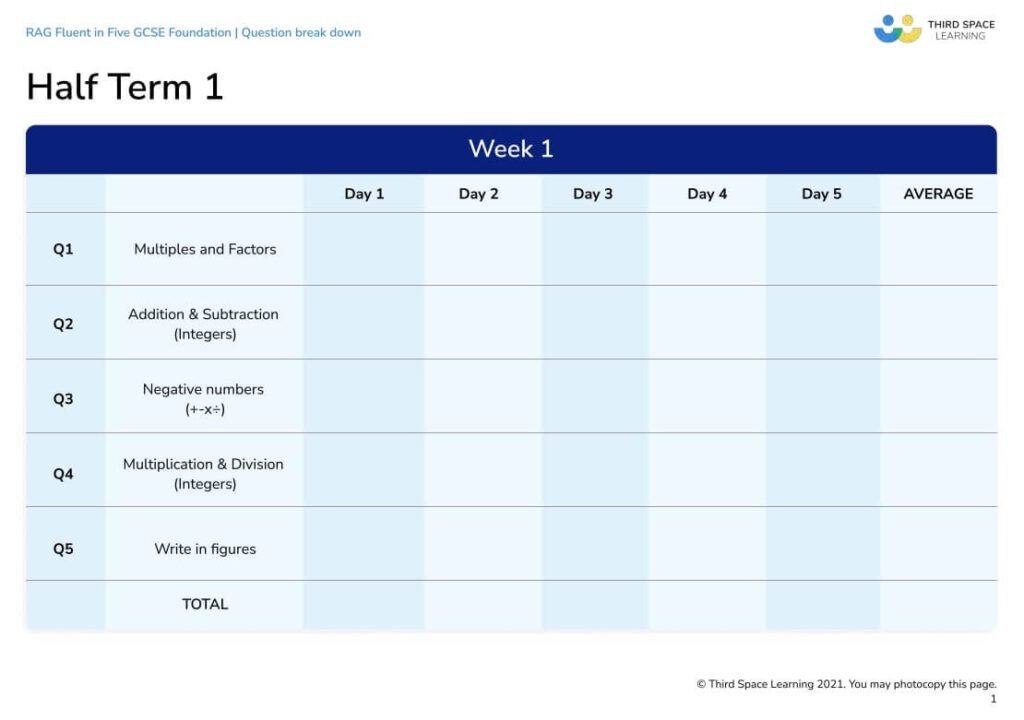
As well as tables to record progress over each half term!
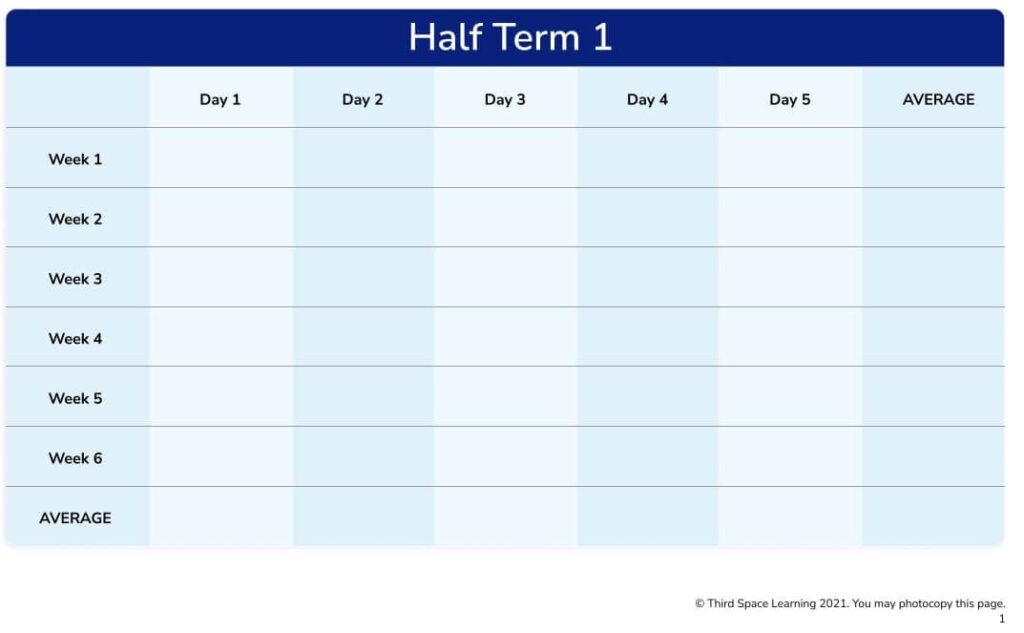
The progress trackers have been designed to allow Fluent in Five to be as versatile as possible when used in school and at home. They can easily be:
- Printed and displayed in classrooms
- Stuck in pupils’ books or folders
- Pinned to the kitchen fridge!
Our hope is that the trackers will enable pupils to follow (and celebrate) their progress over the course of each day and each week within a term.
Pupils can track their progress on a specific topic area over the course of a week. Alternatively, they can monitor their progress across multiple weeks by recording their score or percentage and then calculating their average score to enable easy comparison with their peers.
3) Teacher guide
Fluent in Five also comes with a handy teacher guide to help you get the most out of the resource. The guide gives:
- An overview of what Fluent in Five is
- The approach behind it
- How it is structured
- What is included in the download pack
- Suggestions on utilising the resource when using it with your class
The guide also includes an overview of the topics that are tested in each question and in each week. We hope that this will help you plan your lessons and give you flexibility on how best to use the resource!
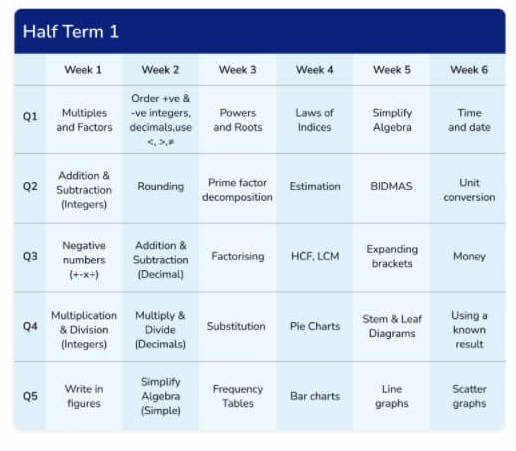
Read more:
DO YOU HAVE STUDENTS WHO NEED MORE SUPPORT IN MATHS?
Every week Third Space Learning’s specialist online maths tutors support thousands of students across hundreds of schools with weekly online 1 to 1 maths lessons designed to plug gaps and boost progress.
Since 2013 these personalised one to one lessons have helped over 150,000 primary and secondary students become more confident, able mathematicians.
Learn how tutors develop pupils’ maths fluency or request a personalised quote for your school to speak to us about your school’s needs and how we can help.
